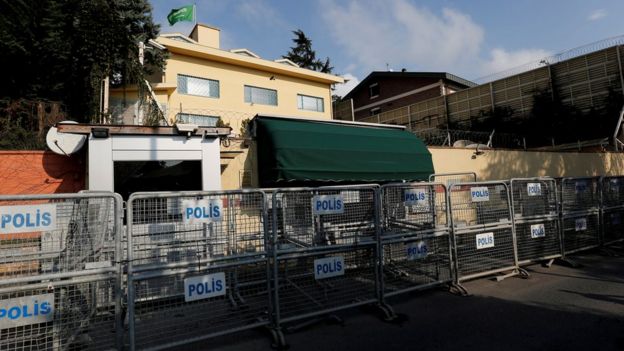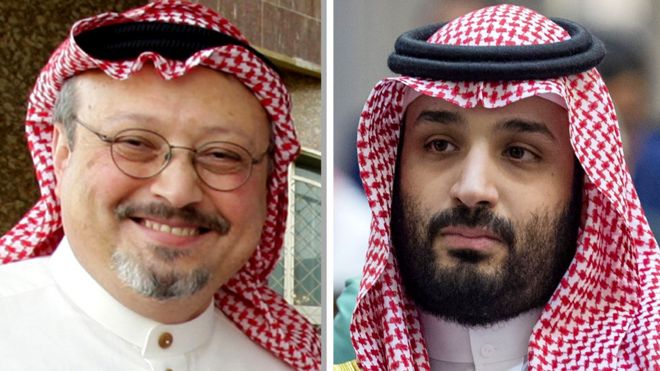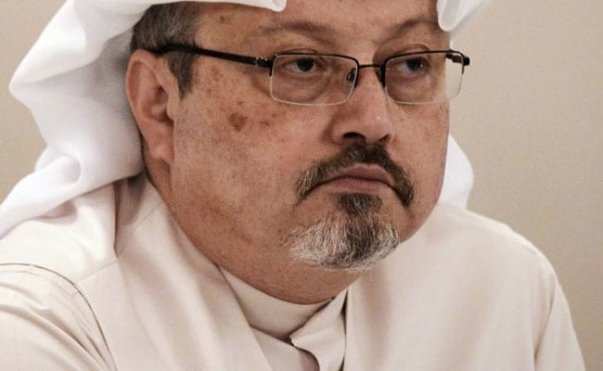There is credible evidence that Saudi Arabia’s Crown Prince Mohammed bin Salman and other high-level officials are individually liable for the killing of Jamal Khashoggi, a UN expert says.
A report by special rapporteur Agnes Callamard says the evidence merits further investigation by an independent and impartial international inquiry.
Saudi agents killed the journalist inside the Saudi consulate in Istanbul.
Saudi authorities insist they were not acting on Prince Mohammed’s orders.
The Gulf kingdom has put 11 unidentified people on trial behind closed doors for Khashoggi’s murder and is seeking the death penalty for five of them.
However, Ms Callamard said the trial had failed to meet international procedural and substantive standards and called for it to be suspended.
Saudi Arabia’s Minister of State for Foreign Affairs, Adel al-Jubeir, rejected the report, tweeting that it was “nothing new” and contained “clear contradictions and baseless allegations which challenge its credibility”.
“The Saudi judiciary is the sole party qualified to deal with the Khashoggi case and works with full independence,” he added.

How did Jamal Khashoggi die?
The 59-year-old journalist, a US-based columnist for the Washington Post and prominent critic of Prince Mohammed, was last seen entering the Saudi consulate on 2 October to obtain papers he needed to marry his fiancée Hatice Cengiz.
Ms Callamard, the UN’s special rapporteur on extrajudicial, summary or arbitrary executions, said Khashoggi was “brutally slain” inside the consulate that day.
Saudi Arabia’s deputy public prosecutor Shalaan Shalaan told reporters in November that the murder was ordered by the head of a “negotiations team” sent to Istanbul by the Saudi deputy intelligence chief to bring Khashoggi back to the kingdom “by means of persuasion” or, if that failed, “by force”.

The UN special rapporteur says Khashoggi was “brutally slain” inside the Saudi consulate
Investigators concluded that Khashoggi was forcibly restrained after a struggle and injected with a large amount of a drug, resulting in an overdose that led to his death, Mr Shalaan said. His body was then dismembered and handed over to a local “collaborator” outside the consulate, he added.
Five individuals had confessed to the murder, Mr Shalaan asserted, adding: “[The crown prince] did not have any knowledge about it.”
What does the report say?
Ms Callamard was tasked by the UN human right’s office with establishing “the nature and extent of states’ and individuals’ responsibilities for the killing”.
Saudi officials insisted that Khashoggi’s death was the result of a “rogue” operation, but the special rapporteur’s report concludes that it was “an extrajudicial killing for which the state of the Kingdom of Saudi Arabia is responsible”.
“From the perspective of international human rights law, state responsibility is not a question of, for example, which of the state officials ordered Mr Khashoggi’s death; whether one or more ordered a kidnapping that was botched and then became an accidental killing; or whether the officers acted on their own initiative or ultra vires[beyond their authority],” the report notes.
Ms Callamard also determined that there was “credible evidence, warranting further investigation of high-level Saudi officials’ individual liability, including the crown prince’s”.
The special rapporteur says the crown prince should be subject to the targeted sanctions already imposed by some UN member states, including the US, against other named individuals allegedly involved in the killing.

The sanctions, focusing on his personal assets abroad, should remain in place “until and unless evidence has been produced that he bears no responsibility for the execution of Mr Khashoggi”, the reports says.
The trial of the 11 suspects currently taking place in Saudi Arabia should be suspended, according to Ms Callamard, because this was an international crime over which there is universal jurisdiction. That would allow other states, such as Turkey or the United States, to also attempt a prosecution.
The report says the UN Security Council should initiate a follow-up criminal investigation into Khashoggi’s murder to build up strong files on each of the alleged perpetrators and identify mechanisms for formal accountability, such as a tribunal.
Does the report shed any new light on the case?
The special rapporteur provides a detailed timeline of what she believes happened before, during and after the murder.
It relies largely on audio recordings of seven conversations inside the consulate made by Turkish intelligence. Ms Callamard was not able to obtain copies of the recordings or authenticate them, but they appear to show:

Prince Mohammed (R) says those who killed Jamal Khashoggi (L) were not acting on his orders
– Two Saudi officials discussed how to cut up and transport Khashoggi’s body just minutes before the journalist entered the consulate. One is quoted as saying: “The body is heavy. First time I cut on the ground. If we take plastic bags and cut it into pieces, it will be finished.” At the end of the conversation, the other asks whether “the sacrificial animal” has arrived
– Khashoggi was told to send a text message to his son “so that we can help you”, but he refused. He is later heard saying: “There is a towel here. Are you going to give me drugs?” Someone responds: “We will anesthetise you.”
– The conversation was followed by sounds of a struggle, during which people are heard saying “Did he sleep?”, “He raises his head,” and “Keep pushing.” Later, there are sounds of movement, heavy panting, and plastic sheets
The special rapporteur was informed by “various governments’ sources” of the names of the 11 individuals on trial in Saudi Arabia.
According to the report, the five facing the death penalty are Fahad Shabib Albalawi; Turki Muserref Alshehri; Waleed Abdullah Alshehri; Maher Abdulaziz Mutreb, an intelligence officer who the US says worked for Saud al-Qahtani, the crown prince’s adviser; and Dr Salah Mohammed Tubaigy, a forensic doctor with the interior ministry.
The other six defendants are Mansour Othman Abahussain; Mohammed Saad Alzahrani; Mustafa Mohammed Almadani; Saif Saad Alqahtani; Muflih Shaya Almuslih, a member of the consulate staff; and Ahmad Mohammed Asiri, former deputy head of the General Intelligence Presidency.
According to interviews conducted by the special rapporteur, the defendants’ lawyers have argued in court that they were state employees and could not object to the orders of their superiors, and that Mr Asiri has insisted that he never authorised the use of force to bring Khashoggi back to Saudi Arabia.
Source: BBC

